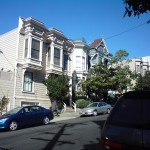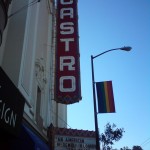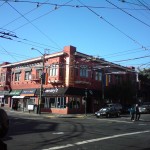Chapter 10: Land of Opportunity
Beyond Dreams of Aberystwyth | The Book
My Dad left Hong Kong in 1959 and lived the next stage of his life in Canada where he met my Mum and where I was born in 1967. But my next stop was the USA and my personal pursuit of the American dream.
I always thought I would live in America ‘when I was grown up’. Being born on the North American continent and the family history of both my parents moving from Britain to North America as young adults to start a new life, it felt like a legacy and the natural path to follow. I haven’t followed that but Canada and America remain places to which I am drawn with a sense of fascination and feeling of home-coming. As a child Canada and America were places in colour – clearly defined seasons – sunny and hot in the summer, autumn leaves, snow for sledging and frozen ponds for ice-skating in the winter. Peanut butter, grape juice, Charlie Brown and Snoopy, Sesame Street. Arriving at Manchester Airport when I first came to England at the age of 4 (my Dad ‘returning’ after a self-imposed exile of 20 years) on a dull September day in 1972 which I still vaguely remember – England by comparison felt grey. (Let’s face it, ENgland was grey in the early 1970’s!) So whenever I’ve been to North America since I have always felt a sense of familiarity, excitement and homecoming, and it was there again as I landed in the USA – San Francisco – this time.
I’ve always been slightly fascinated by USA in particular, I’m not sure why. I think it’s a place of extremes and complexity that the rest us in the world don’t always give it credit for. The world being saturated by all things American, the rest of us can think we ‘know’ America but I’ve always been surprised at how ‘other’ it feels when I’ve actually been there – 2 cultures divided by a common language as they say.
But obviously the USA was more familiar territory for me on this trip – more similar culturally than Hong Kong, Malaysia or Eastern Europe – and the same language making a lot of practical things easier. Plus on this stretch I was mostly staying with people, as opposed to hostels and hotels – with friends and friends of friends – a mixture of Americans and Brits. This gave me a more insider view, and made me feel less vulnerable as I had at times, but I was also a bit sad to lose my outsider status – no longer Emma alone – and blend in.
I started my journey in Eastern Europe – old countries, poor countries, places people leave – both people of the past like my Jewish ancestors, and people today. Malaysia and Hong Kong are ex-colonies, nations shaped by the long dominant presence of European nations, ‘new’ countries with high hopes following their independence. The USA is the place everybody – allegedly – wants to be – the world’s mythic Land of Opportunity. Within 24 hours, walking on beautiful Pacific Beach to get grounded after the long flight and jetlag – I saw people from every other nation I had already been – East Europeans, Malaysians, Jews, Chinese – everybody’s here! – to pursue their own American dream.
I love San Francisco. The architecture, the spectacular landscape of its streets, the culture, beautiful parks, alongside a huge sandy beach. The lovely laidback attitude of its people – fairly unique in the USA – a friendly, genuine and non-judgemental interest in, camaraderie with and acceptance of every sort of ‘other’ – ethnicities, sexualities, everything. Being a rural-dweller at home myself these days San Francisco is one of the only cities I could ever live in now, in my dreams. What’s not to like?
It’s only when you travel that you really get the opportunity to feel how culturally specific you are – how ‘British’ in my case – and what that means. For example in San Francisco I noticed very quickly how moaning and complaint is a peculiarly British trait – by virtue of being in proximity to Americans who do far less of it! In San Francisco the relentless positivity was almost wearing but after a while I let the cynicism down and the fresh air in.
Another myth I quickly found myself losing was that America is a rich or even in certain respects an ‘advanced’ country. I have tended to believe in the USA as a pinnacle of western advancement and wealth, a lot of us do. I noticed shop signage in San Francisco that looked 1970’s in a way that I haven’t seen… well, since the 1970’s in the UK; not in a cool retro way, in a not-refurbished-since-the-1970’s way, a bit shabby and terribly out of date. Still in business but nope, can’t afford to re-furbish. That genuinely shocked me, but I saw lots of that kind of ‘scraping by’ poverty that I don’t associate with the west and certainly not with the USA. I thought America had more money than that.
There is of course also far less state infrastructure there for the poor or those who are unable to compete or function than in Britain – the great debate. When I was there in 2010 Obama was going through his first fights about free healthcare, considered a virtual communist by some for even suggesting it. But personally I find it quite shocking that if you are hit by bus in the allegedly most advanced economy in the world you won’t be picked up by an ambulance and given free medical attention. How ‘developed’ or civilised is that? I met a woman in San Francisco one evening – a European now resident there – who said to me, ‘In America if you’re poor, you’re really poor.’ And all the people I was talking to that evening – again Europeans living in USA – said they would definitely return to Europe before they retired. They were all earning pretty good money but none of them could afford to pay for medical insurance or put by for a pension and they all said America is too difficult a country to be old and poor in. How shocking, I thought, for those of us imagining the American dream from afar.
But there are many positives about the American way, the classlessness of it for a start, which again being there made me notice that very British trait by virtue of its absence. Service culture is the best place to see this. Americans are so good at service! I felt so looked after! Waiters and waitresses, people in shops – so helpful, genuinely friendly, nothing’s any trouble and they really want you to have what you want without any superciliousness. Being British I responded with lots of please and thank-yous which seemed to win them over even more! ‘You’re so welcome. Is there anything else I can do for you today?’ Americans don’t feel this work demeans them, it’s a job and a perfectly good one. And those ’being served’ seem to – by and large – treat those serving them as equals simply doing a job any one us may have done once, or could do again. I’ve worked as a waitress, cleaner, in shops and I don’t think this work makes me or anyone a lesser person, I just think it’s a crap job, most British people do, which affects how we do it (grudgingly, resentfully). Or we treat others doing it as people we are paying to do as we bid, like servants. Clearly this is a generalisation, but I felt in America there is a strong instinctive belief that someone waiting tables has as much dignity and capacity to be an interesting and dynamic person as anyone else.
Okay, let’s not get carried away, even I don’t believe anyone can become president. But this egalitarian vibe feels very much more at the core of American consciousness, and was lovely to feel. Perhaps this is a legacy of a nation built of people coming in and everyone trying to make their way from the ground up at some stage or another – an earlier generation or this one. And it’s a very positive and endearing aspect of the USA – this strange and unwieldy nation of people drawn from all over the world at one stage or another to build a new life.
Back to Chapter 9
Forward to Chapter 11
Full Table of Contents
If you have enjoyed this and would like to see ‘Beyond Dreams of Aberystwyth’ go further please click on this link to see what you can do to help make that happen! You can also submit comments below. Thanks for reading.











Leave a Reply